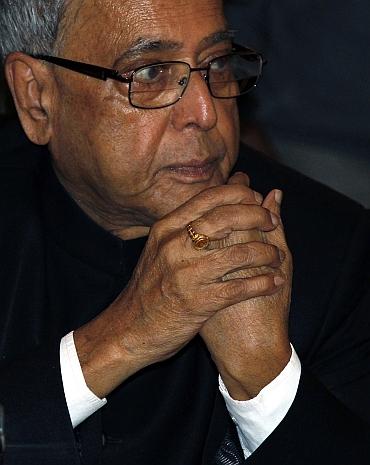
On the eve of the winter session of the Parliament, which commenced on Tuesday, Finance Minister Pranab Mukherjee invited Bharatiya Janata Party President Nitin Gadkari for lunch. Mukherjee's overture was clearly to pacify the irate Opposition and ensure the smooth functioning of Parliament. But will the Congress's strategy save the winter session?
On the eve of the winter session of Parliament, which started on Tuesday amidst din and disruptions, Finance Minister Pranab Mukherjee reached out to the Bharatiya Janata Party President Nitin Gadkari in what many in government hope would become an "ice breaker".
The government was reportedly spurred into action after the criticism it invited at the India Economic Summit recently where corporate leaders, worried about the downturn in the economy, had flayed the government's year-long paralysis in decision-making. Gadkari was also present at the Mumbai meeting.
Mukherjee invited Gadkari to his home for lunch on Monday in what was a one-on-one meet, and is believed to have sought the opposition party's cooperation to put the economy back on the rails -- and to further the stalled economic reforms agenda of the government, reflected in some of the bills which are slated to come up before Parliament in the winter session.
Even though the meeting is not expected to alter the BJP's strategy on pushing ahead with its offensive against the government, which includes an adjournment motion on black money and more significantly, a boycott of Home Minister P Chidambaram, it may start to address the Opposition's grievance that the government did not take them into confidence.
...
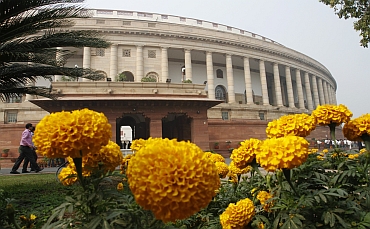
It goes without saying that Pranab Mukherjee, who had taken a backseat of late, was playing his troubleshooting role again and he could not have met Gadkari without a go-ahead from Prime Minister Manmohan Singh and Congress President Sonia Gandhi.
Mukherji's overture to Gadkari is clearly part of the government's strategy to reach out to an irate Opposition and defuse the impasse that could build up in Parliament in the coming days.
All those who were shouting in the Lok Sabha on Tuesday, after the obit references read out by Lok Sabha Speaker Meira Kumar -- the Rajya Sabha had adjourned for the day because two of its members had died in the intersession period -- were undoubtedly playing to the gallery. They had their eyes on their constituents back home who were watching the gusto with which their representatives in Parliament were raising the issues close to their hearts.
The Telangana Rashtra Samithi members of Parliament shouted for a separate state of Telengana, the Samajwadi Party members opposed the division of Uttar Pradesh, a card played by Mayawati. The Shiv Sena MPs rushed into the well of the house. The National Democratic Alliance MPs protested when Chidambaram placed his reply to a question -- it happened to be his day in the Question Hour.
When Pranab Mukherjee started to read out a statement on the price situation -- the strategy was obviously to preempt an adjournment motion entailing voting on the issue of prices -- it was drowned out in the noise. Sensing the mood of the house, Meira Kumar adjourned the Lok Sabha for the day.
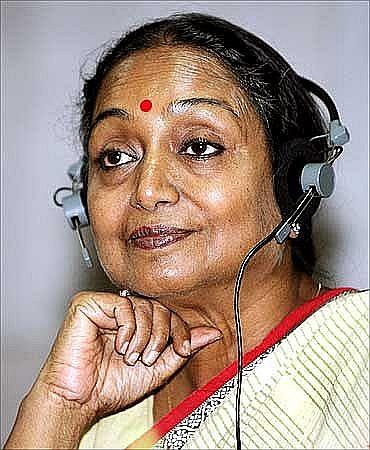
The first day of the winter session of Parliament, which was a washout, brought to the fore forebodings about history repeating itself. Would the 2011 winter session also go the way of the 2010 winter session, which did not legislate any business because the Opposition parties were unrelenting in their demand for the constitution of a Joint Parliamentary Committee to probe the 2G scam?
While every party had an eye on their specific vote banks, the fact is that the opposition parties are smelling an opportunity in the country today. They are sensing a mood -- of anguish and anger -- against corruption and rising prices, and want to tap into it. They would like to utilise the winter session of Parliament to set the tone for the coming state assembly elections in UP and four other states early next year.
For this reason, the 2011 winter session is seen as being more significant than many other sessions in the past. The forthcoming state elections are expected to have a bearing on the future politics of both the mainline parties, the Congress and the BJP, and their stakes are very high. If the Congress wins Uttarakhand and Punjab and can form a coalition government in Lucknow with the Samajwadi Party and Rashtriya Lok Dal, it will help the ruling party turn around an otherwise increasingly hostile mood in the country.
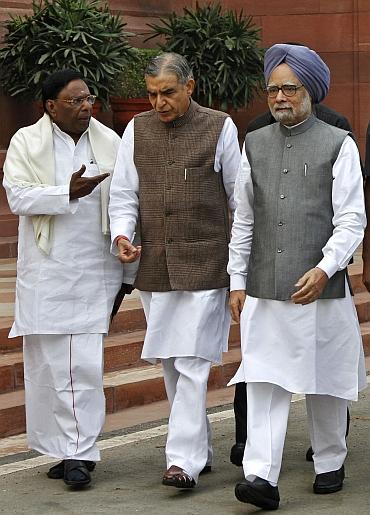
The Congress had hoped to establish its seriousness about combating corruption by passing the Lokpal Bill, which the Standing Committee is expected to finalise by December 7, and the Whistleblower and Judicial Accountability bills, and these would give it brownie points in the ensuing state polls.
As for the BJP, at one stage, it had toyed with the idea of bringing in a no-confidence motion against the United Progressive Alliance government. But they abandoned the idea for it would help rally the allies behind the Congress.
Instead, they opted for a strategy which could bring down another pillar of the UPA government. Their strategy to up the ante is reflected in their 'Target Chidambaram' move, and not allowing him to speak till he tenders his resignation for his alleged culpability in the allotment of spectrum in 2008, for which former telecom minister A Raja is in jail.
If they can put Chidambaram, who is already on the defensive, under pressure or compel him to quit, they would further dent the authority and credibility of an already weakened Manmohan Singh government.
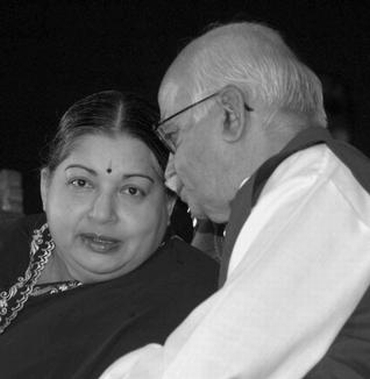
The BJP's calculation is that, the mood in the country being what it is, the more aggressively it attacks the government the greater its appeal. It will also help the party recover the ground it has progressively ceded to the civil society in recent months.
It could also have other spin offs for the BJP. It will help keep the searchlight on the issue of corruption and the 2G scam, which has damaged the UPA more than anything else in the last year.
It will go down well with the Rashtriya Swayamsevak Sangh, who had held Chidambaram responsible for the action against the Hindu terror organisations.
It would also please Tamil Nadu Chief Minister J Jayalalithaa, who has been attacking Chidambaram. The All India Anna Dravida Munnetra Kazhagam supremo has given enough indications recently that she has an open mind about joining the NDA alliance and her party emissary had sat on the dais along with the BJP and NDA leaders, at the end of L K Advani's Jan Chetna Yatra at the Ramlila Grounds two days ago.
For these reasons, the Pranab-Gadkari meet is not expected to yield immediate results, though it does open dialogue between a senior member of the government and the head of the main opposition party.